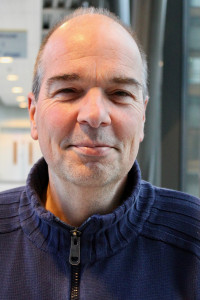Associate professor

Research:
To properly respond to growth-stimulatory and growth-inhibitory signals in their micro-environment, cells possess multiple signal transduction pathways, consisting of specific enzymes, messenger and adaptor molecules that transmit these signals from their receptors to the nucleus, where transcription factors convert them into specific gene expression programs. To be able to integrate the information from different types and doses of stimuli that can reach a cell simultaneously or within short (repeated) intervals, signaling molecules from distinct pathways interact at many levels, both on the membrane, in the cytoplasm and in the nucleus, thereby forming large molecular networks that are often localized to specific sub-cellular structures. During carcinogenesis and cancer progression cells lose their ability to correctly respond to growth inhibitory signals, and/or show increased sensitivity to growth-stimulatory and pro-invasive signals. This is the result of genetic defects, such as mutation, deletion or amplification of specific signaling molecules, or due to epigenetic events such as gene silencing.
I have in particular been interested in the detection, identification and functional characterization of signaling complexes and intermediates that distinguish different types of cancer cells from each other and/or from normal cells, or differ during the different stages of tumor progression. These complexes might function as diagnostic and/or prognostic markers and become targets for (patient-specific) therapeutic intervention.
Currently, I am studying the functions of specific de-ubiquitinating enzymes, in close collaboration with Paul Geurink of the CCB group Chemical Biology & Drug Discovery.
Curriculum Vitae:
I studied molecular sciences in Wageningen, the Netherlands. My PhD research has been performed in the group of Alex van der Eb at the laboratory of Molecular Carcinogenesis, University of Leiden, and focused on the mechanism of oncogenic transformation by the adenovirus E1A oncogene. I subsequently worked for 2 years as an EMBO fellow in the group of Peter Herrlich and Peter Angel at the Karlsruhe Research Center, and for 5 years as a KNAW fellow at the department of Molecular Cell Biology at the LUMC. I studied the mechanisms by which genotoxic stresses and growth factors can activate MAPkinase pathways and transcription factor AP-1 components, and, in addition, the effects of the various members and specific dimeric combinations of these protein families on cellular phenotypes.
Sundqvist A, Vasilaki E, Voytyuk O, Bai Y, Morikawa M, Moustakas A, Miyazono K, Heldin CH, ten Dijke P, and van Dam H.
Oncogene 39, 2020, 4436-4449
Ouwens, D. M., de Ruiter, N. D., van der Zon, G.C.M., Carter, A. P., Schouten, J., van der Burgt, C., Kooistra, K.,. Bos, J. L, Maassen, J. A., and van Dam, H.
EMBO J. 21, 2002, 3782-3793
van Dam, H., Huguier, S., Kooistra. K., Baguet, J., Vial, E., van der Eb, A.J., Herrlich, P., Angel, P. and Castellazzi, M.
Genes Dev., 12, 1998, 1127-1239.



Looking for information on one of our topics, a new place to conduct your research or experienced research to join forces with? Feel free to contact us.!